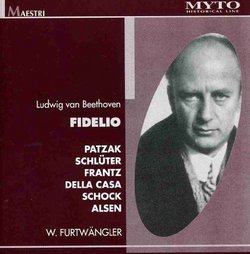| All Artists: Beethoven, Patzak, Schluter, Furtwangler Title: Fidelio Members Wishing: 1 Total Copies: 0 Label: Myto Records Italy Release Date: 1/18/2000 Album Type: Import Genre: Classical Styles: Opera & Classical Vocal, Forms & Genres, Theatrical, Incidental & Program Music, Historical Periods, Classical (c.1770-1830), Modern, 20th, & 21st Century Number of Discs: 2 SwapaCD Credits: 2 UPCs: 789368877126, 8014399500258 |
Search - Beethoven, Patzak, Schluter :: Fidelio
 | Beethoven, Patzak, Schluter Fidelio Genre: Classical
|
Larger Image |
CD Details |
CD ReviewsThis Is a 1948 Fidelio, NOT the one with Flagstad!!! Nancy Rathbun | New York City | 10/21/2005 (5 out of 5 stars) "I'm not actually writing a review of this recording as I don't know it well, but I thought it important to mention that this is a different Furtwangler Fidelio than the one the reviewer above is talking about. This is a live 1948 Salzburg Festival Fidelio (two years earlier than the one with Flagstad). Furtwangler conducts the Vienna Philharmonic, the Chorus of the Vienna State Opera and a cast that includes Erna Schlueter as Leonora, Julius Patzak as Florestan, the great Ferdinand Frantz as Pizzaro, the incandescent Lisa Della Casa as Marzelline, the young Rudolf Schock as Jacquino (to think it wouldn't be too long before della Casa and Schock would be singing Ariadne and Bacchus in Strauss's Ariadne auf Naxos together!), Herbert Alsen as Rocco and Otto Edelmann as Don Fernando. There are dropouts (including Pizzaro's aria IIRC) in all available pressings of this recording." Furtw�ngler's "Fidelio"s Lasse S�ager | Copenhagen, Denmark | 06/21/2000 (4 out of 5 stars) "It is obvious to hear that Beethoven was close to Furtwängler's heart - indeed it is no exaggeration to say that Beethoven was the most important composer to this the finest German conductor ever. The most interesting aspect of Furtwängler's career of conducting Beethoven is the way his approach to the works evolve - there is great difference between, say, a pre-WW2 recording of the 6th Symphony and a post-war recording. Sadly, Furtwängler died in 1954, before he was able to commit to record most of his repertoire - furthermore, he wasn't very interested in the recording media, which was, of course, at that age not very advanced, technically. Two versions of Fidelio exist - this live recording from the Salzburg Festival 1950 and a studio recording from 1953. There is no significant difference in Furtwängler's conducting (how interesting it would have been to have heard a pre-war performance!), which is in both cases inspired, perhaps more dramatic in the live versions. The main difference between the two recordings, therefore, is the cast. The Salzburg performance features such great stars as Patzak and Flagstad, whose promise, however, lay in the past. Their performance is impressive, but well-worn, so to speak. The studio recording shows the new generation, Martha Mödl and Wolfgang Windgassen, who are at the beginning of their distinguished career (many will remember Windgassen's "Siegfried" under Böhm in Bayreuth 1967). If I had to choose between these to hallmark versions, I'd choose the studio recording for its fresh, vibrant and dramatically present cast. Also, the sound quality of the Salzburg recording is VERY live - much coughing and poor balance at times!"
|

 Track Listings (14) - Disc #1
Track Listings (14) - Disc #1